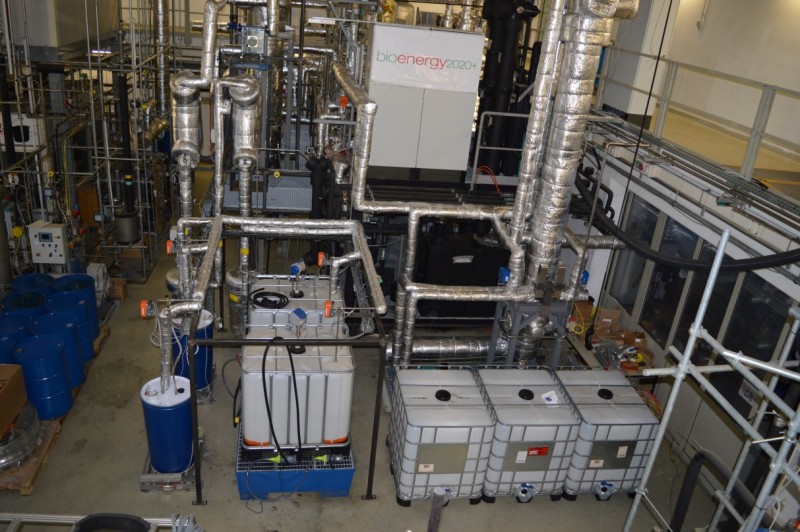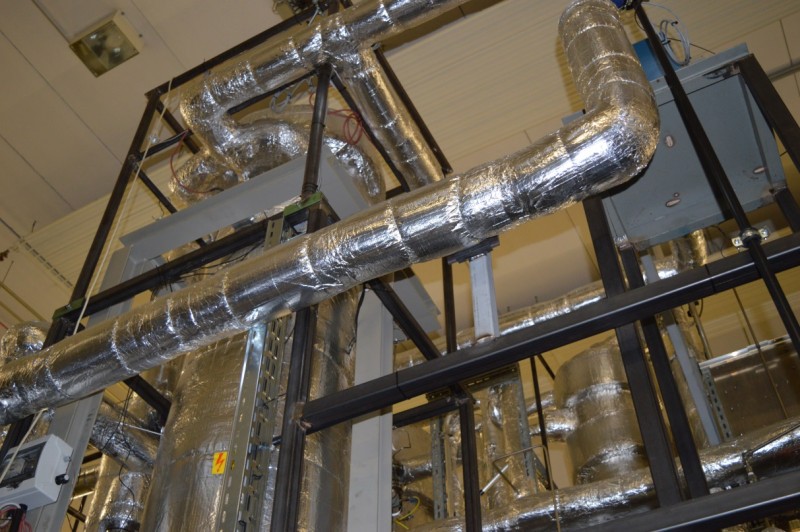Barrel / day Fischer Tropsch
The objective of the COMET project "Barrel / day Fischer Tropsch" is the planning, construction and operation of a plant for the production of Fischer-Tropsch (FT) products (diesel, kerosene and biowaxes from wood) in the scale of one barrel per day of production capacity. In the autumn of 2016 the plant was commissioned after one year of planning and construction. This pilot plant, which is unique in the world, was planned and implemented by BIOENERGY 2020+ at the Güssing site and can now, be used for further research.
With the completion of this unique facility an important step has been taken to increase the profitability of advanced biofuels. Valuable knowledge on the way from the laboratory to the industrial plant can be gained by this.
In the next phase of the project, the facility will be subjected to experimental tests, in order to obtain data for the simulation of the overall process. In particular, the flow behaviour of the slurry reactor (mixing of the catalyst through the synthesis gas) is evaluated by measurement technology in order to have sufficient data for a further development step on industrial size. A further aim of the project is to test the fuel produced in the tests under real conditions on modern diesel vehicles.
With the help of this pilot plant, the scale has been increased from the laboratory to the pilot plant scale. Since 2005, Güssing has been researching the biomass-based FT Technology at a laboratory scale of 10 LPD (liter per day) and has gained valuable insights into the topics of gas purification and processing, long-term stability of FT catalysts, design of slurry reactors as well as product separation and fractionation. The knowledge gained has been taken into account in the planning of this pilot plant. The pilot scale represents an important if not the most important milestone on the way to a demonstration facility.
The hydrocarbon compounds produced can be used as second-generation high-quality fuels (diesel and kerosene) or as non-fossil substituents for chemical substances. FT advanced biofuels are free of aromatics and sulfur and have a significant reduction potential for emissions. Furthermore, HPFT (Hydro-processed FT diesel) has an excellent cold behaviour. Thus, the kerosene boiling section would be suitable as a high-quality aviation fuel. The waxes mainly composed of saturated hydrocarbons can be used as additives in the chemical industry. This means that FT synthesis not only provides advanced biofuels but also raw materials for the chemical industry.
Projektlaufzeit
2015-04-01 - 2019-03-31
Supported by
FFG, COMET
Projektpartner
Bilfinger Bohr- und Rohrtechnik GmbH
Güssing Renewable Energy GmbH
PKN Orlen S.A.
Vienna University of Technology
Unipetrol a.s.
University of Chemistry and Technology Prague, Institute of Chemical Technology
VUANCH
Contact
Area Management

Matthias Kuba
matthias.kuba@best-research.eu

Gerald Weber
gerald.weber@best-research.eu
Publications
Influence of operating conditions on the performance of biomass-based Fischer–Tropsch synthesis
Production of advanced biofuels
Upscaling and Operation of a Biomass Derived Fischer-Tropsch Pilot Plant Producing 1 Barrel Per Day
Modification of Co/Al2O3 Fischer–Tropsch Nanocatalysts by Adding Ni: A Kinetic Approach
Phase Sewparation Behaviour of FAME and Water
Liquid biofuels from biomass steam gasification
Biomass Gasification for Synthesis Gas Production and Applications of the Syngas


